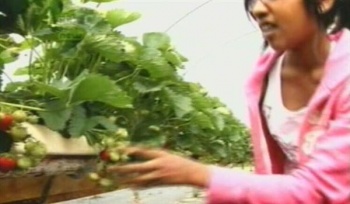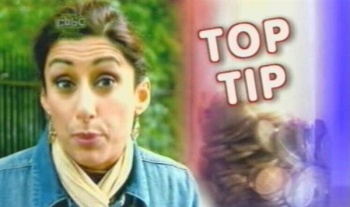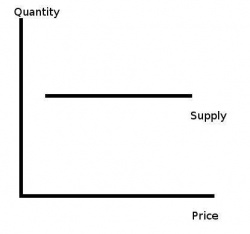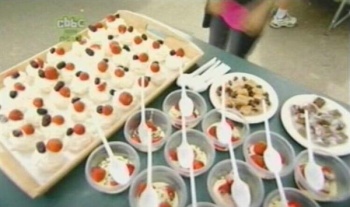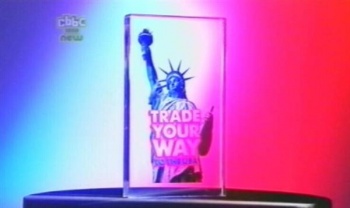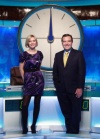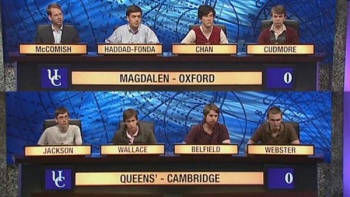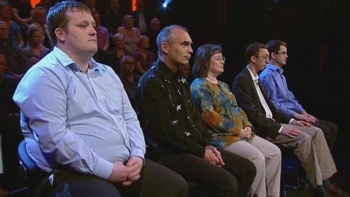Weaver's Week 2011-03-13
Last week | Weaver's Week Index | Next week
This week, we're reviewing news from YTV, making unflattering comparisons to the cricket world cup, getting thoroughly confused by different people with the same name, and gearing up for a charity appeal. But if we can make a profit, perhaps we might not be here....
Contents |
Trade Your Way to the USA
Leopard Films for CBBC, 14-25 February
The purpose of children's television is to provide an education into all facets of life. It has to have the funny (Dick and Dom) and the serious (Evacuee). There needs to be the educational (Little Howard's Big Question) and the brain-dead (Sadie J). There needs to be the sharing (Blue Peter) and the selfish. Right here.
Trade Your Way to the USA is not the most cryptically-named programme ever to grace the pages of the Radio Times. It does pretty much what it says in the billing. Two teams of children are invited to test their skills and judgement by buying some items, converting them into something else, and selling the results. The most successful sides in two rounds will take part in the final, held in New York.
The host for this lesson in economics is Saira Khan. Readers of a certain vintage may recall that she finished second in the original series of The Apprentice, back in about AD 500. Viewers of the CBBC channel will know her from the long-running programme Beat the Boss. She explains the challenge given to the competing teams, and explores what it is they're doing at any given moment.
The sample episode we saw (from 16 February) was based on fruit farming, concluding with the teams selling some sweet desserts at a farmer's market. The show begins with two teams of three children are taken to a pick-your-own fruit farm, and given a guided tour of the facilities – what is a fruit, what makes a good strawberry, and so on. They're then given a little time to work out what they're going to make with their fruit, and then fifteen minutes to pick as much fruit as they think they'll need. Why only a quarter-hour? It feels like an artificial deadline, imposed for the convenience of the producers, so that they can get footage of Saira chivvying the teams along. There may be restrictions on how long the children can work, but this isn't explained. Indeed, the ideas are sufficiently well-developed to make us think that the teams had prior notice of the challenge, and were able to give it some thought.
After picking the fruit, the teams are allowed and encouraged to haggle for how much they should pay for their produce. Even though the price on the board is £3.99 per kilo, the farmer is prepared to let the teams pay less. It's almost as if he knows that they're going to be spending the balance of their £75 budget in his farm shop anyway, and the more he takes from fruit, the less they'll pay on jams and cream. And it's almost as if he knows that his farm is going to be seen on national television, and if he is seen to be generous to the teams, this good publicity will lead to more business coming his way.
Throughout this picking-and-buying stage, Saira Khan is popping up with "helpful" "advice" on how to be a top trader. Some of this tends to the blindingly obvious – if you can reduce the price you pay for something, it becomes cheaper. Other entries are questionable – while it's true that adding additional ingredients might allow a trader to charge a higher price, Saira doesn't point out that it's necessary to make sure the extra cost covers the price of the additional ingredients, and both the extras and the fact that there's a choice might put some customers off.
Yes, stripped to its bare essentials, Trade Your Way to the USA is a demonstration of the most basic principles of economics: the supply and demand "curves". (For economists, straight lines are curves. This explains why they made careers in something boring like economics, and didn't take exciting jobs like designing roller-coasters.) The supply curve says that if someone can sell Some goods for a low price, they'll sell More goods at a higher price. The demand curve says that if the price is low, people will buy More goods; if it's high, they'll only buy Some goods. Where these two curves intersect, that's the price to charge and the quantity to make. Some of Saira's points are demonstrations of somewhat more esoteric principles – the option of adding cream to one's strawberries is an example of "price signalling", which is very well explained in Tim Harford's book "The Undercover Economist".
But we digress. There's a game show to review, and two teams who have finished scouring the farm shop, bought up all their ingredients, and now are setting up stalls at the farmer's market. One team is selling little meringues with a fruit-and-cream filling, and they've sunk £20 into a hamper of various farm goodies that they're trying to auction off. The other team is making little fruit punnets out of strawberries and raspberries and blueberries and blackberries, with the option of cream or marshmallow or icing sprinkles if people will pay extra for it.
Almost inevitably, there's a decent amount of footage from the selling phase, and it's never particularly clear which side is in the lead – if, indeed, either side can claim the advantage at this phase. There seems to be a prohibition against using the day's takings to buy further ingredients, or other things to sell on the stall. For the second time in the show, there's an artificial deadline, after which all sales must stop. Is this to do with restrictions on how long children can work? Again, it's not explained or mentioned on the show.
Anyway, after all of this, Saira gathers the teams together, and reveals the results. The winning team is declared the winners, and the losing team is out of the competition. But they had a good time, they all do. Actually, the winning team might be out of the competition, too: only the four best winners from the seven heats will progress to the semi-final stage, and the winners there get to go to the final. Which, as we're reminded every five minutes, takes place in New Amsterdam. And, yes, there's a trophy: shockingly, only the winners can get it.
At heart, Trade Your Way to the USA is a naked capitalist programme. It believes that the free market is the peak of human endeavour, and will celebrate its successes and minimise its failures – teams making a loss are still said to have recovered £68 of their £75, or whatever the number is. Now, we had a pop at Michel Roux's Service a few weeks back, on the grounds that it's pretending to be a game show about waiters when it was actually an advert for rapacious consumption and the idea that flashing money around can cover up for impoliteness. There's no such Trojan horseplay for Trade Your Way to the USA – it never pretends to be anything it's not. It does what it says in the title.
Countdown Update
This coming week is Cheltenham week, and Countdown is off air for a few days. It gives us an excuse to review what's been going on in the last few weeks of competition.
We left Countdown with Edward McCullagh putting in some very strong performances. Almost inevitably, he completed his eight wins before retiring undefeated – a total of 896 included seven centuries, five scores of 110, and two in the 120s. He will be a very strong challenger for the title in June. Andy Campbell won two games (233 pts), and Mark Jones had one win (151).
Ned Pendleton became the second octochamp of the series, though his best score was 92, and his total of 664 would only have made him 7th seed last December. Nick Adigu-Burke recorded one win (144 pts), and Michelle Nevitt became the first female champion of the year – she totalled 336 points in four wins. Andy McGurn carries his bat through the week off, he's already had four wins.
The seedings are:
| 1 | Adam Gillard | 8 | 903 |
| 2 | Edward McCullagh | 8 | 896 |
| 3 | Ned Pendleton | 8 | 664 |
| 4 | Andy McGurn | 4 | (so far) |
| 5 | Michelle Nevitt | 4 | 336 |
| 6 | Mike Pickering | 3 | 318 |
| 7 | Dave Dyer | 2 | 280 |
| 8 | Jody Sparrow | 2 | 254 |
University Challenge
Deci-final 9: Magdalen Oxford v Queens' Cambridge
In 2007, we snarked that The National Lottery People's Quiz was a lot like the cricket world cup: it went on for months and months, splitting out a few obvious candidates for the final from many applicants by means of sheer repetition. We're increasingly thinking that that criticism is appropriate for University Challenge's incessant deci-final phase. It does not take a month of games to determine that Zimbabwe, Canada, and Kenya are weaker than other cricket sides. It does not take ten matches to determine that Sheffield, Magdalen Oxford, and Peterhouse Cambridge are worthy of places in the semi-final. The only point of interest is which side will make up the quartet – will it be England, the West Indies, Bangladesh, or York?
On the slightly unreasonable grounds that we've so far found semi-finalists at the rate of one per month, Magdalen have yet to confirm their place in the next phase, having lost to Sheffield by 5 points in 455 back in January. They won their second match by the slightly more convincing margin of 210 points. Queens' inflicted a 190-160 defeat on Bristol, but fell to Peterhouse by 215-160. The winners progress to the semi-final, the losers finally go home.
The match begins with ... a missignal. Great. Magdalen pounce, and achieve perfection on a series of bonuses about sayings popularised by Little Billy Shakespeare. Planck's constant and abandoned villages help Queens' pull closer, only for Magdalen to do well on the sons of Priam. There is, apparently, a hotel in Japan that's been in operation for over 1300 years; allegedly, there's a guest from opening night who is still waiting for room service to deliver his order of lemon-scented napkins. The first visual round is on obscure political figures like Helmut Kohl – it's not Gorbachev, there's no wine-stain. Magdalen's lead is 55-20.
Other post-communist leaders prove less obscure to Magdalen, and opera houses brings up the team's century. Thumper quotes the first lines of science-fiction novels, including one about "being watched by minds much greater than our own", and Only Connect is back for a special edition next Monday. Words from the German help Queens' a little, but about this they care rock all. Oh, sorry, "Rockall" is the answer they're looking for, which is followed by people whose surname was Levi. There's a name for the scientific study of clouds? Can't think why there shouldn't be. Magdalen are pointless when asked a series about the physics of fibre-optic cables, but do better on unfinished operas, taking the lead to 140-50.
It's off to the Aztec zone for the next set of bonuses, including note-perfect renditions of Tenochtitlan from both Thumper and Magdalen captain Matthew Chan. The crore, the wan, and the economic billion are all powers of ten with unusual names, but Magdalen get the lot. Questions on blue colourings put them past 200, the lead is up to 160, and we're quite prepared to write Game Over.
At which point Queens' get questions on homographs, words written the same but with different meanings, like moped and moped. Clues to three anagrams are a rather fun idea for the next starter, leading to the names of French départements. Magdalen get back with scientists who gave their name to SI derived units, that's the second visual round, and their lead is 225-95. Even Thumper sounds surprised when someone knows that "Chipping" indicates there was a market there, and when someone works out the sum of the first 200 positive integers — but not by adding them all up. Does the M87 lead to Triangulum? Ooh, no, you'll want to take the M33 and turn off just after the Large Magellanic Cloud.
In the next set of bonuses, Thumper defines a three-letter word, which also begins the name of an African country. Queens' get two of them, and then get the origin of Lassa fever. Lateral thinking is, logically, opposed to vertical thinking.; Queens' add that, and endothermic reactions, and palindromic names, and the Great Glen fault, but it's never going to be enough. At the gong, Magdalen have won it by 245-195.
Well, that turned out tighter than we might have expected. Will Cudmore got six starters for Magdalen, who managed 23/39 bonuses. Six starters also for Mark Jackson of Queens', who made 18/33 bonuses. The night's first missignal was the only one, and overall accuracy was 65/98.
Next week: Oxford Brookes v York
Mastermind
Second round, match 2
John Wharton is our first contender tonight, he's taking World Heavyweight Boxing Championship 1960-95. As the name suggests, this is a series of questions about heavyweight boxers. All of the questions are about male boxers, as women's boxing had not yet been re-instituted. The contender gives the full location of Caesar's Palace, when it's only the hotel itself they're after. Still, lots of correct answers, and a final score of 12 (0).
Brian Pendriegh is back amongst us, and he's discussing Sean Connery (b 1930). The Scottish actor is best known for his film role as James Bond, and inspired Ian Fleming to write a part-Scottish ancestry for his creation. He won a BAFTA award for "The Name of the Rose", and quietly retired from film-making around the turn of the century. No quiet retirement for the correct answers, which mount up to 13 (0).
Third up is Gillian Taylor, she's got Butch Cassidy (1866-1908?) Born Robert LeRoy Parker in Beaver, Utah, Cassidy began his criminal career by "borrowing" a pair of jeans and promising to pay for them later. He rustled cattle, and – as part of the Hole in the Wall Gang and The Wild Bunch – stole from banks, and either died or vanished early in the last century. He was popularised by the 1969 movie "Butch Cassidy and the Sundance Kid". A fair few errors, and a couple of long thinks, mean her score is 7 (0).
Edmund Dickinson has been reading the Travel Books of Bill Bryson. A native of Iowa, Bryson began his travel writing in the 1970s, penning pieces for "The Times" and latterly "The Independent", before returning to the US in the 1990s. His books are observational and witty, primarily discussing the minutiae of everyday life. One such minutia is the score: 13 (0).
Tim Fenn is our final contender, he's taking the Life and Times of John Adams (c.1543-1586). Born in Winterborne St Martin, Adams became a minister in the Protestant church, but converted to Catholicism while in France in 1580. Returning to England, he was captured at Winchester and banished back to France. He came back again, but ran fowl of a law banning the Catholic clergy. He was convicted of this offence, and hung, drawn, and quartered at Tyburn. None of this needs concern the contender, who has taken John Adams the second US president, where he scores 13 (1).
Gillian Taylor begins her general knowledge round by remembering the "cobbler" pudding, and the plot of the BBC casting show "Over the Rainbow". She got here by taking Josephine Baker as her subject on Bonfire Night, and almost suggests that the tennis player known as "Little Mo" was the former Labour MP Mo Mowlam. But not quite. The 1812 Overture advances her score, which ends on 17 (0).
John Wharton won way back on 10 September with Julius Caesar, since when he's had plenty of time to dunk his biscuits. Who made the crack about "Stalin to Mr. Bean?" Ah, that evades the contender's mind, but the revival of Rab C Nesbitt doesn't. The round never quite gets going, and finishes on 19 (9).
Brian Pendreigh kicks off with high-definition television, the Newcastle double-decker bridge, and perestroika. He won on 8 October with The Beatles, and we noted at the time how he was wearing a bright starry shirt. It's back, it's his trademark. Somewhat more surprisingly, after an early flurry of accuracy, he gets a number of errors, until "North by Northwest" helps him to advance further. Then the Grace Brothers and Amen Corner help to run up the score, which finishes with 22 (5).
There's no high-scoring loser in this week's show, everyone is going for their second win. Edmund Dickinson got his first on 26 November, discussing Formula 1. Which soap opera has characters on Ramsay Street, asks one question, thus rather ruining a joke we've planned for a few weeks hence. The Monument and Texas Longhorns advance the score, but not until after a particularly painful set of errors. The contender knows about Orloondo Bland, and the Beserkers, and just when he's picking up speed again, the round comes to an end at 23 (4).
So Tim Fenn needs eleven to win outright, ten might do the trick. He was this year's first winner, taking the 7 January show with John Hunter. Languages of Spain, the log flume, the acting career of Will Smith all get him going. He makes good guesses at questions that have a few answers, and picks off some old stagers – what subject grants LLB degrees? How was Trotsky killed? (No, not by in-fighting.) Thomas the Tank Engine takes him past the winning post, and a final score of 25 (2).
It's Tim Fenn, a GP from Barnet, who claims the second place in the Mastermind final.
This Week And Next
Ratings for the last full week of February, supplied as ever by the BARB. Dancing on Ice remains number one with 7.85m viewers, but Let's Dance for Comic Relief runs it very close – 7.75m saw the celebrities making fools of themselves. Secret Fortune (6.05m) continues to beat Take Me Out and Push the Button – the latter barely scrapes past 4m, where we find The Biggest Loser. Masterchef had 5.5m tuning in. University Challenge was BBC2's top-rated game show, 3.1m viewers, and Come Dine With Me is Channel 4's biggest game, 2.8m.
As you were on the digital channels, with Celebrity Juice (1.46m) seeing off a spirited challenge from Got to Dance's live final (1.37m). The Tool Academy final comes in third, 645,000 saw the spade being called a spade, or whatever it was that happened. Lower down, Challenge scored its first audiences of 200,000, and Junior Masterchef Australia brought 190,000 viewers to Watch.
Comic Relief week features a special edition of Only Connect (BBC4, 8.30 Monday), and highlights of 24 Hour Panel People (BBC3, 10.30 Su-Th; 10pm We; omnibus from 9.20 Sa, and highlights of the highlights on BBC1 later in the month). Changes to daytime because of the Cheltenham Festival: Countdown's only going out on Monday, and Deal or No Deal makes a slight return to 4.15. Pointless is back (BBC2, 4.30), and Glee Club makes it on air (BBC1, 5.15). The main Comic Relief appeal is on Friday night (BBC1, from 7pm), while over on Radio 3 Maestro's Sue Perkins is conducting the world's largest kazoo orchestra.
To have Weaver's Week emailed to you on publication day, receive our exclusive TV roundup of the game shows in the week ahead, and chat to other ukgameshows.com readers, sign up to our Yahoo! Group.


